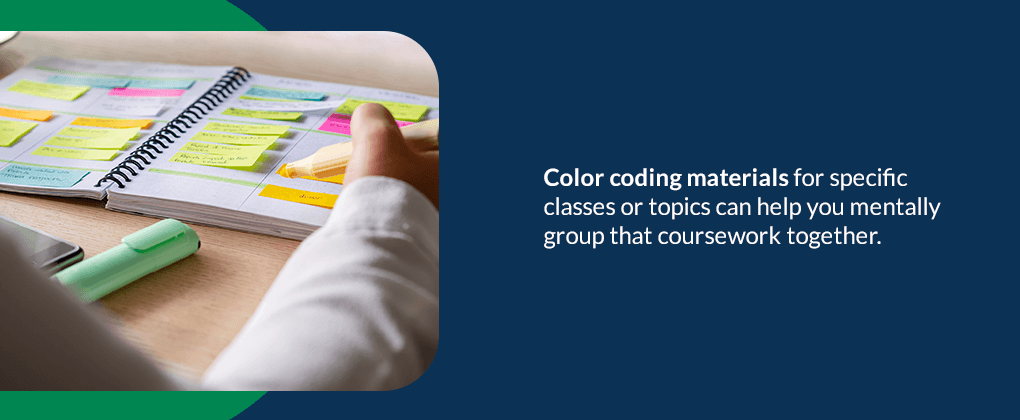
Learning how to study in college can be easy. Taking the time to discover what works best for you takes time, but there are plenty of methods to explore. Not every habit will work for every student, but there are so many study tips for college students that you’re sure to find one or two that work for you.
The best study strategies for college students can increase attention and focus and limit distractions. From discovering your learning style to chewing gum, there are plenty of ways that you can take control of your study habits. To help you create healthy college study habits and excel in your education, we’ve created a list of seven college study hacks that you can use for your next exam.
1. Discover Your Style
To maximize your learning capabilities, you should take the time to discover how you learn best. The four main learning styles are auditory, visual, kinesthetic or reading and writing. Many people do best when utilizing more than one method but broadly fall into one of these categories.
The four types of learning styles include:
- Auditory: Auditory learners do best when they can hear new information. These learners can benefit from reading their notes aloud or having conversations with other students about the materials. If you prefer to study alone, you could record yourself working through your materials and play it back later.
- Visual: Visual learners prefer to see new information. You can create diagrams to present related information together if you’re a visual learner. Color-coding your notes can help you organize your materials and help you associate similar details.
- Kinesthetic: Students who prefer kinesthetic, or hands-on learning, do well in labs and workshops. Although it can be difficult to study while being a hands-on learner, you can try to implement touch tactics. For example, walking around while reviewing notes or exercising while listening to recordings can help keep you focused.
- Read or write: Students who prefer to write or read do well with textbooks and notes. These students can benefit from taking extensive notes during lectures and reviewing that information when reading textbook chapters. Rewriting information and saying it aloud can help these students remember complex topics.
You can find quizzes online that will tell you exactly which style you have and how to use it to your advantage. Because most students are a combination of these styles, you should try out different tactics to find out the best fit for you.
2. Get Creative
Although some people worry they may seem bored in classes by drawing in their notebooks, doodling has great memory benefits. Studies have shown that light doodling can improve memory retention by 30% and increase attention span. Creating art can also boosts blood flow to the brain and helps to keep your mind from wandering.
Doodling during complex materials may not be the most effective way to retain information, but if you struggle to concentrate, doodling may help you focus your attention on the lesson while still engaging your hands and mind in a simple activity.
3. Use Mnemonic Devices
Mnemonic devices are excellent memorization tactics. You may remember a particular saying to memorize the mathematical order of operations, order of planets or the directions on a compass. If you still remember these devices, you already know how effective these tools can be.
On top of a fun little saying, you can create songs, rhymes or acronyms. Anything that helps you associate materials together or remember what a word means, you can use to help you remember later.
4. Rewrite Your Notes
Note-taking tips for college students boil down to organization. Color coding materials for specific classes or topics can help you mentally group that coursework together. You could use the same color folder and notebook or a specific color pen for one class and another color for another course.

You can also organzine your papers to encourage taking additional notes. You can draw a line an inch or two into your page and use that small column to take notes about how you feel about the topic, write questions for later or remind yourself to look further into a subject. Use the large portion of your page to write lecture information and the small side to record additional information for yourself.
5. Chew Gum
This tip might seem odd, but chewing gum can increase alertness. Although we’re not sure exactly why this is the case, scientists believe the act of chewing helps to keep us awake and improves our mental performance.
Chewing gum is not only great for studying but taking tests. For more association tactics, you could try chewing the same gum flavor while studying and taking the associated exam. Chewing the same flavor during the exam may help you remember the information you reviewed when studying. If you employ this tactic, choose a sugar-free gum variety to limit your sugar intake.
6. Make a Playlist
Most people would agree that listening to their favorite music puts them in a better mood. When we’re in a good mood, we’re more likely to stay focused and push ourselves a little harder to overcome our challenges. However, finding the balance between music you like and music that won’t distract you can be a challenge.
Music with vocals can be distracting because you can start to focus on the words you’re hearing more than the words you’re reading in your textbook. You can combat this by searching for instrumentals of your favorite songs, turning to classical music during study time or finding some video game songs for background noise. You should still enjoy what you listen to, but it shouldn’t distract you.
7. Avoid Distractions
Speaking of distractions, there are a few more that you should avoid when studying. Social media is one of the biggest distractions when it comes to studying. It can be easy to give in to the urge to check your notifications and browse through videos or photos, but this is one of the quickest ways to turn a productive study session into a wasted few hours.
You can employ the old-fashioned silent mode on your phone if notifications tend to distract you. If the pull of browsing social media is too tempting for you to resist, there are also apps you can use to block or limit your time on specific sites. You might also consider employing a concentration method like the Pomodoro technique to incorporate both focused study time and breaks into your session.
Show Your Skills at Mount Wachusett
Mount Wachusett Community College was founded in 1963, and we’ve been dedicated to serving our community ever since. Our faculty is a team of individuals who want to see you succeed and will do everything they can to help you get there.
Whether you’re fresh out of high school, seeking dual-enrollment, trying to restart your education or want to build your professional skill set, we have over 70 certificate and degree programs that can give you the leg up you’re looking for.
There’s no place better to show off your tips for studying in college than Mount Wachusett Community College. You can apply online or request more information to find out how we can prepare you for your future career and guide you towards success.


